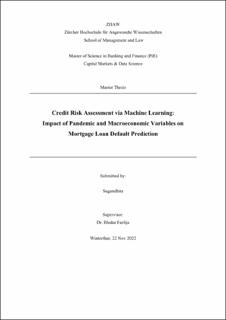Please use this identifier to cite or link to this item:
https://doi.org/10.21256/zhaw-29648| Publication type: | Master thesis |
| Title: | Credit risk assessment via machine learning : impact of pandemic and macroeconomic variables on mortgage loan default prediction |
| Authors: | Sugandhita |
| Advisors / Reviewers: | Fazlija, Bledar |
| DOI: | 10.21256/zhaw-29648 |
| Extent: | 63 |
| Issue Date: | 2022 |
| Publisher / Ed. Institution: | ZHAW Zürcher Hochschule für Angewandte Wissenschaften |
| Publisher / Ed. Institution: | Winterthur |
| Language: | English |
| Subject (DDC): | 306: Culture 332: Financial economics |
| Abstract: | Credit risk forms an integral part of any financial institution, and the onset of COVID-19 pandemic warrants assessment of credit risk on priority. Applicability of machine learning methods has been increasingly extended to assess credit risk. Assessing the borrower’s capability of repaying the loan or categorizing the borrower as high or low risk, is one of the many instances where machine learning is applied. However, when the pandemic disrupted and halted the economies, most machine learning models tended to fail in predicting the defaulting borrowers correctly. The primary aim of this master’s thesis is to demonstrate the impact of the pandemic on a simple decision tree model which is one of the baseline models used by many institutions and researchers to assess borrower risk due to its interpretability. Moreover, in the light of highly imbalanced nature of the data with majority towards non-defaulters, the impact of pandemic can be assessed on various sampling techniques which could be used to produce better results. As consumer behavior is affected by their surrounding environment and the state of the economy, macroeconomic indicators could provide signals or better predictions while predicting borrower defaults. The aim of the thesis extends to incorporating a few relevant macroeconomic indicators as independent variables in the models to assess if the same increase the predictive performance of the model. To enable this, mortgage loan performance data from Fannie Mae is utilized from the years 2015 until 2020 coupled with macroeconomic variables for predicting mortgage loan default. Decision tree models are trained and fine-tuned for the loan performance data from 2015 to 2017 using sampling techniques such as undersampling, and oversampling, and evaluated on the following years including the pandemic year 2020. The models are again tested in combination with the macroeconomic variables to assess if the predictive performance of the models is affected. The results indicate that although the use of macroeconomic indicators does return better results than models without macroeconomic data, when the models are evaluated on out oftime data pertaining to the year 2020, the predictive performance declines substantially. Based on this, it could be demonstrated that pandemic indeed impacted the performance of a model used for mortgage loan default prediction but adding the macroeconomic variables as extra independent variables slightly improved the predictions. Further research in this domain can be extended to using superior machine learning methods such as ensemble or deep leaning models for an improvement in predicting defaults. In practice, the macroeconomic indicators could be complemented with historical loan performance data to improve not only the credit scoring models but also models used for predicting probability of default or loss given default. |
| URI: | https://digitalcollection.zhaw.ch/handle/11475/29648 |
| License (according to publishing contract): | CC BY-NC-ND 4.0: Attribution - Non commercial - No derivatives 4.0 International |
| Departement: | School of Management and Law |
| Appears in collections: | MSc Banking and Finance |
Files in This Item:
| File | Description | Size | Format | |
|---|---|---|---|---|
| 2022_Sugandhita_MSc_BF.pdf | 4.35 MB | Adobe PDF |  View/Open |
Show full item record
Sugandhita. (2022). Credit risk assessment via machine learning : impact of pandemic and macroeconomic variables on mortgage loan default prediction [Master’s thesis, ZHAW Zürcher Hochschule für Angewandte Wissenschaften]. https://doi.org/10.21256/zhaw-29648
Sugandhita (2022) Credit risk assessment via machine learning : impact of pandemic and macroeconomic variables on mortgage loan default prediction. Master’s thesis. ZHAW Zürcher Hochschule für Angewandte Wissenschaften. Available at: https://doi.org/10.21256/zhaw-29648.
Sugandhita, “Credit risk assessment via machine learning : impact of pandemic and macroeconomic variables on mortgage loan default prediction,” Master’s thesis, ZHAW Zürcher Hochschule für Angewandte Wissenschaften, Winterthur, 2022. doi: 10.21256/zhaw-29648.
Sugandhita, 2022. Credit risk assessment via machine learning : impact of pandemic and macroeconomic variables on mortgage loan default prediction. Master’s thesis. Winterthur: ZHAW Zürcher Hochschule für Angewandte Wissenschaften
Sugandhita. 2022. “Credit Risk Assessment via Machine Learning : Impact of Pandemic and Macroeconomic Variables on Mortgage Loan Default Prediction.” Master’s thesis, Winterthur: ZHAW Zürcher Hochschule für Angewandte Wissenschaften. https://doi.org/10.21256/zhaw-29648.
Sugandhita. Credit Risk Assessment via Machine Learning : Impact of Pandemic and Macroeconomic Variables on Mortgage Loan Default Prediction. ZHAW Zürcher Hochschule für Angewandte Wissenschaften, 2022, https://doi.org/10.21256/zhaw-29648.
Items in DSpace are protected by copyright, with all rights reserved, unless otherwise indicated.